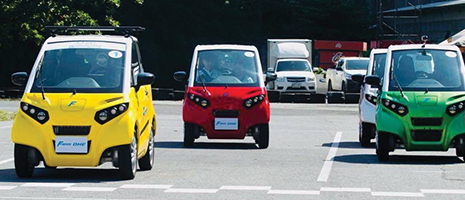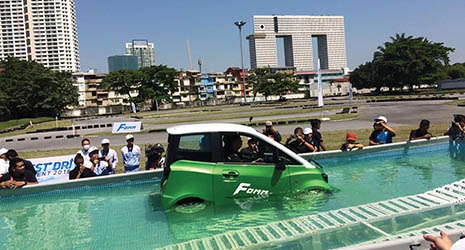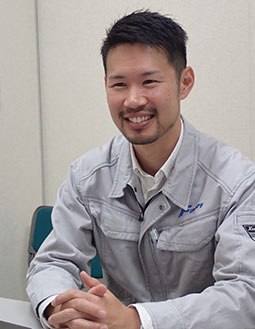Home > Highlighting JAPAN > Highlighting Japan February 2019 > Science & Technology
Highlighting JAPAN


A Tiny Electric Car That’s Waterproof and Floats
A small Japanese startup has invented an electric vehicle that floats on water, a new take on mobility that will enrich lives and save people during tsunamis and floods. The company, called FOMM, aims to start mass production and sales in Southeast Asia, and hopes local production will energize local economies there.
The compact electric vehicle FOMM ONE is a floating car. Thanks to its specially designed turbine-shaped wheels, this EV can slowly move across water.
Many lives were lost in the huge tsunamis that hit Tohoku’s coastal regions after the Great East Japan Earthquake that struck on March 11, 2011. That disaster inspired CEO Hideo Tsurumaki, who saw a need for a floating waterproof car, to found his startup FOMM in 2013.
“Our earliest experimental car was like a floating bathtub with tires and doors,” recounts Takayuki Morita, who headed the development of the FOMM ONE. “We designed it to float for about one day during times of flooding, so it wasn’t built for both land and sea.”
Development engineers have flocked to FOMM. That’s not surprising, because founder Tsurumaki was in charge of COMS—Toyota’s ultra-small single-rider EV—from planning to development. FOMM took about a year to complete its first concept model, however, and Morita recalls running into difficulty sourcing parts and other issues as an unknown startup.
The current FOMM ONE can seat four despite its body size being classed as the world’s smallest. To ensure adequate space in the car, FOMM ONE has motors in its front wheels (for front-wheel drive), and the steering wheel and accelerator are integrated. The driver’s hands control the accelerator while braking is done with the feet, so drivers won’t mix up the brake and accelerator. Morita says this may help elderly people in depopulated areas remain mobile.
The company name, FOMM, stands for “First One Mile Mobility” and represents the company’s belief in helping people cover the “first mile” needed to link them to greater mobility. The car’s top speed is eighty kilometers per hour, and it has four rechargeable lithium ion batteries. On a full charge, the FOMM ONE can travel for 160 kilometers (or 100, if the air conditioner is used).
In Southeast Asia, where floods occur regularly, an unsinkable car could be a true lifesaver. Since it was founded, FOMM has focused on a target market of developing countries in Southeast Asia, and aim to start selling vehicles in Thailand by February 2019. The sales price there is 664,000 baht (about US$21,000). While this is fairly expensive compared to the cost of a gas vehicle in the same class, the price reflects the importance the Japanese automobile manufacturer places on safety. FOMM aims to reduce the cost further so the car can be marketed more widely.
A local subsidiary in Thailand is handling production and sales for the FOMM ONE, and FOMM would like to grow the business into a regional industry. To accomplish this, the assembly is made as simple as possible, requiring only a small number of parts and using components that can be sourced locally.
“One of our founding principles is to eradicate poverty, and our goal is not simply to make electric vehicles but to develop cars that can enrich people’s lives,” Morita emphasizes. “Through the spread of the FOMM ONE, we’d like to help solve Southeast Asia’s problems of poverty and environment.”
After Southeast Asia, FOMM has its eyes on the European market, where EVs are already popular, and the company hopes to release the vehicle in Japan by 2020. As this startup and its visionary Japanese engineers seek to enrich people’s lives with small electric cars that can float above floods, the world is taking notice.
© 2009 Cabinet Office, Government of Japan







